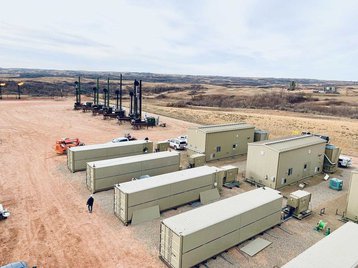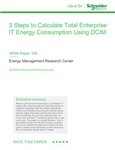Crusoe Energy Systems is expanding to Argentina, where it is using waste gas to power computing systems. However, in the US it is facing a patent infringement suit from a crypto mining firm.
US-based Crusoe has announced its first Latin American "digital flare mitigation" project in Argentina's Vaca Muerta oilfield. With assistance from a new climate finance firm Unblock, Crusoe will place containerized data centers at wells in Vaca Muerta, to be powered by natural gas which would otherwise be flared off.
Oil companies currently burn ("flare off") large amounts of natural gas at oil wells, because it is uneconomic to exploit it. Crusoe Energy places gas turbines at oil wells, and uses the otherwise wasted gas to power containerized computers performing tasks that are believed to be mostly cryptomining, but also include AI and supercomputing.
Crusoe claims the process benefits the environment because otherwise wasted energy is used, and the gas is burnt more efficiently, releasing less unburnt methane. Methane is a potent greenhouse gas (GHG). Burning it converts it into CO2, a much less potent but more long-lasting GHG. Crusoe's figures claim that burning methane to CO2 results in a 69 percent decrease in short-term CO2-equivalent emissions compared to flaring.
The process has also been labeled "greenwash" as it makes fossil fuel exploitation look a little greener, without doing anything to reduce overall fossil fuel use.
Crusoe was founded in 2018 and raised $128 million in 2021 to expand its business, which now has more than 120 container-based data centers sitting at oil wells in North Dakota and Montana. Crusoe gathered a further $500 million in 2022, led by green fund G2 and recently acquired Great American Mining. It also absorbed its modular container-building partner Easter-Owens, acquired the continuers of crypto firm Compute North which went bankrupt, and signed a deal for load-shifting software with crypto mining firm Lancium.
This is the first international expansion of Crusoe’s DFM technology and represents an important milestone in Crusoe’s global expansion plans and efforts to mitigate methane emissions. Globally, approximately 90 percent of the world’s flaring occurs outside of the United States, which is why Crusoe has always envisioned international operations as part of its long-term mission to align the future of computing with the future of the climate. Argentina is the 12th biggest global emitter of methane, according to World Bank data. It has previously taken investments from Abu Dhabi and Oman.
Methane emissions are the second largest cause of global warming according to the IEA and reducing methane emissions is a key pillar of broader decarbonization efforts.
Crusoe's partner Unblock says that climate technologies developed in the US are needed in other counties, but are not being exported: "Developing countries, in their fair pursuit for economic progress, are building infrastructure that will lock emissions for the next 40 years," says its website.
"The United States, through public research and abundance of private capital, is fueling a boom of climate technologies. Unfortunately, climate companies take over 10 years to grow south. The added complexity and risk make projects in Latin America, Africa, and Southeast Asia significantly harder than those in the US."
The exclusive partnership with Crusoe in Argentina is Unblock's first project. Tomas Ocampo, Unblock CEO and founder, said: “At Unblock, our mission is to help leading climate technology companies enter and scale in Latin America.”
“We are very excited about Crusoe’s expansion into Argentina and appreciate Unblock’s unwavering commitment in the region, which is helping Crusoe further our mission to align the future of computing with the future of the climate,” added Cully Cavness, Crusoe’s co-founder, and president.
Patent suit
There is a cloud on Crusoe's horizon, however. Upstream Data, based in Canada has sued Crusoe, claiming a US firm patent infringement, while a host of other firms seem to be offering the same service.
The lawsuit, filed in the United States District Court for the District of Colorado claims Upstream holds the patent for a flare gas-powered Bitcoin mining facility, and has deployed more than 350 such Bitcoin mining facilities across the United States and Canada. Upstream says Crusoe was aware of its patent while developing its product.
Meanwhile, other players are using flared gas for crypto.
Bitcoin mining rig provider Atlas Power has teamed with gas energy firm Giga Energy to offer a service similar to Crusoe's, converting stranded flare gas energy to electricity for Bitcoin mining, so it can "harness an otherwise wasted resource, reduce greenhouse gas emissions, and generate value through the energy-intensive process of Bitcoin mining."
Cryptoblox of Vancouver has entered a deal with True North Data Systems, to site a data center at an oil well in Sturgeon County Alberta, burning waste gas to power CryptoBlox's crypto mining systems.
And finally, oil producer Allied Energy Corp is working with cryptominer Enerhash, to place a flare gas-powered bitcoin mining data center at the Thiel Well a site near Brenham Texas, which Allied acquired in 2022, when the previous owner, Jenex Petroleum, refused to repair a leak in the flowline.




